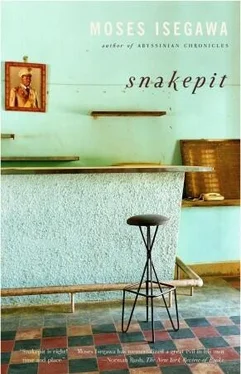Another time Ashes brought three white nuns dressed as Kakwa traditional dancers. They wore flamboyant headgear, skin loincloths, beads and amulets, and carried spears and bull-horns. They leaped and swayed clumsily while the scandalized audience clapped and whispered. A large bathtub was brought and they held a mud-wrestling contest. Afterwards the Marshal found out that the women were not nuns but the wives of Copper Motors officials. He loved Ashes’ creativity and improvisation.
On another occasion Ashes came wearing a gorilla suit with axe teeth and red lips. The audience froze, expecting Amin to take grave offence. The gorilla hopped about snatching hats from the heads of appalled generals. Amin clapped loudest. Some generals suspected that the Marshal had ordered the hat-snatching just to humiliate and unsettle them. Maybe they were the gorillas. In a world of shifting loyalties and acute uncertainty, Robert Ashes seemed to be the only person above it all, if you disregarded Dr. Ali, who alternated as God or Satan and came and went as he pleased. He could do no wrong. He was a loaded gun which could go off in anybody’s face. To cap it all, the Marshal had promoted Robert Ashes to the rank of colonel in the Uganda army, as a reward for his tireless efforts to stamp out the cancer of coffee-smuggling. This, General Bazooka thought bitterly, at a time when the cancer was grinding to its climax. And why was he not promoted for putting down the most recent rebellion in the army?
Up to this moment General Bazooka had feared only one man: the Marshal. Now he discovered that he also feared Colonel Robert Ashes. How long would it take before this reptile got promoted to general? And how much more dangerous would he become?
“General, I am thinking about investigating this affair properly,” Ashes said, grinning, savouring the fact that he had made the word “general” sound like it meant “pus.” He lit his Cuban cigar and pulled a large volume of smoke into his lungs. “Uganda cannot afford to be in the bad books of the Saudi royal family. Those people can topple this government in the blink of an eye.”
General Bazooka overlooked the insult and started panicking. He really did not know what to do. He thought about begging Ashes for time, for mercy, for any scrap of benevolence out of desperation. “Take it easy, Colonel. It is nothing serious,” he said, mustering up his courage.
“Marshal Amin will decide what is serious and what is not, General.”
By now General Bazooka was sure that there was a spy in his ministry, just like he planted spies in other ministries. He was determined to take swift action. With the spy, or spies, gone, he knew that Ashes would be stalled.
“Enjoy the party, General,” Robert Ashes said enigmatically, and walked away.
General Bazooka became so angry that he almost had a fit. His lower lip quivered and his hands shook. He was losing touch. What had become of the Victoria woman? Nothing. He had sent her on a mission and instead of doing her job she had become pregnant. He could have set things right, but he had just ignored it. He had become soft and lost sight of his priorities. Perhaps that was why he had lost his beautiful islands and crocodiles and the command of the prestigious Anti-Smuggling Unit. Perhaps the Marshal saw that he was no longer as sharp as before and had decided to teach him a lesson and send him a big warning. This had to end. Now. He had to nip it in the bud. He had to show that he was still the best commander, or one of the best commanders, in the country.
AT A FEW MINUTES PAST FOUR that afternoon, Bat got a phone call summoning him to the Nile Perch Hotel. It was not unusual to be in the middle of something important and then be called away. On his cynical days Bat said that he was nothing more than a messenger boy for the General. It always put him in a temper to be torn away from something, but he was learning to live with it. He set everything aside, slid on his coat, straightened his tie, and walked out. Cursing, he got into his car and drove off. It was a fine day: clear, hot, windy, not a trace of humidity in the air. The Parliament Building looked majestic, a monument to power carved out of ivory. The soldiers at the gate were statuesque, the smoke coming from their cigarettes adding a grotesque touch to their figures. A string of Boomerangs swept past, horns blaring, tailed by Stinger jeeps with swaying aerials.
Within minutes he was at his destination. He parked, locked, and walked away from his car. He briefly thought about the prince’s Porsche 999. He could feel the vibrations that monster engine had given him in the desert. He walked quickly, hardly noticing the soldiers lying about in the grass, weapons held idly, now benign as sticks. Did this sort of boredom breed the killer instinct and fire up the explosions? The soldiers looked at him with supreme indifference. He was just another suit, another boss to many people in a certain office or factory brown-nosing with a general or colonel or somebody else of real importance. Nothing showed on the faces of the soldiers, which looked dead, buried in the depths where no man, except their commanders, could reach them. They seemed untouched by love, hate, passion, moved only by the order to act.
He entered the hotel lobby, which was empty and airy, making it look like any other hotel during the off-season. He relaxed, remembering the wonderful hotel he had slept in in Saudi Arabia, with its air-conditioner, Jacuzzi, huge rooms, obsequious room attendants and twenty-four-hour room service. As he was beginning to wonder where the hotel staff were, in an instant four soldiers in combat uniform, wearing helmets covered with jungle webbing, surrounded him. They twisted his arms behind his back, forced his head down, and frog-marched him toward the guest rooms. He was in such shock that he did not say a word. If he had seen such frightening faces before, it had been in his dreams. The time between his last moments of freedom and his present state had lasted barely over a minute. He was thrown in a very dark room. They tore the clothes off his back like hyenas ripping a kill’s coat. They left him in his underwear. Bad sign. Stabbed, shot, strangled in his underwear was common news. They marched out of the room without saying a word.
He stretched out his hands and felt his way around the empty room. An alarmingly musty smell was coming from somewhere. The windows had been blackened out with layers of cloth held up by tight wire mesh. The room was not soundproof, and he could hear army boots hammering the floor, army vehicles being parked outside, and army men barking orders in chilling harsh voices. He sat down on the floor, back against the wall, and tried not to think. His own pain he could deal with well: the athletic spirit was still in him. It was the pain his condition was going to cause others — Babit, his family, her family, his friends — that sat on his chest like a sack of rotting potatoes. What was Babit going to do? Wait and wait, become desperate? In a land where anything was possible, imagining the worst scenario was the best antidote against optimism and the unnecessary pain it brought. Who was going to inform whom? Had somebody seen him? Of course. Would he or she risk talking? That was the question. Was this going to be passed off as just another disappearance? What would his staff do? He realized how little he personally knew them. He heard very loud steps. They reverberated in his chest, kicked off a cold sweat as they hammered past the door. Where was General Bazooka? When was he going to show his face?
Late in the evening the door was flung open. Bat was shaken by a scalding rush of fear. Soldiers entered, lifted him off the floor, blindfolded him and, twisting his arms behind his back, led him out. He felt his stomach fall to below his knees. Outside, the cold wind smacked his skin. He imagined the city around him eating, drinking, cowering in self-preserving indifference. A cold shiver of futility went down his back. They threw him in a Stinger and drove off. He could feel the vehicle going round and round, charging up hills and rushing down valleys. The city had long since become a catacomb, swallowing its people while keeping a straight face. Nakasero and Naguru hills housed notorious detention centres. Police stations had also become infected with the killers’ bug. People were kept there incommunicado while relatives went crazy searching the more well-known detention centres.
Читать дальше











